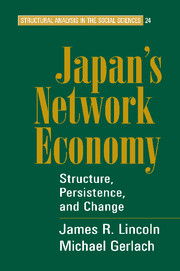Book contents
- Frontmatter
- Contents
- List of Figures
- List of Tables
- Acknowledgments
- Introduction
- 1 The Structural Analysis of the Network Economy
- 2 The Origins of Japanese Network Structures
- 3 The Evolution of a Corporate Network: A Longitudinal Network Analysis of 259 Large Firms
- 4 Exchange and Control: Explaining Corporate Ties: A Longitudinal Dyad Analysis
- 5 Intervention and Redistribution: How Keiretsu Networks Shape Corporate Performance
- 6 Japan's Next-Generation Industrial Architecture
- Bibliography
- Index
6 - Japan's Next-Generation Industrial Architecture
Published online by Cambridge University Press: 05 April 2010
- Frontmatter
- Contents
- List of Figures
- List of Tables
- Acknowledgments
- Introduction
- 1 The Structural Analysis of the Network Economy
- 2 The Origins of Japanese Network Structures
- 3 The Evolution of a Corporate Network: A Longitudinal Network Analysis of 259 Large Firms
- 4 Exchange and Control: Explaining Corporate Ties: A Longitudinal Dyad Analysis
- 5 Intervention and Redistribution: How Keiretsu Networks Shape Corporate Performance
- 6 Japan's Next-Generation Industrial Architecture
- Bibliography
- Index
Summary
Japan is going through its biggest social upheaval since the Meiji Restoration.
Masayoshi Son, founder and CEO, Softbank Corporation.Introduction
As to what degree the network structure of the Japanese economy has withered away, our analysis from the 1960s to the 1990s yields a mixed picture. Signs of disintegration abound — in the fabric of the corporate network as a whole, in the boundedness and coherence of individual keiretsu groupings, and in the general decline of redistributive intervention to align and smooth the growth and profitability trajectories of affiliated firms. Yet the indications are also substantial that, at odds with the recent conventional wisdom, the recessionary 1990s were to some degree a time of retrenchment, not abandonment, of dense networks, keiretsu forms, and performance alignment. This pattern, we think, comports with the core function that keiretsu serve: as mutual support networks that sustain member firms through difficult times. Critics, however, argue that the system of risk-sharing and reciprocal obligation is the reason that the Japanese economy got in trouble in the first place and is having such difficulty extricating itself from bad times. The Economist (2002), ever critical of Japan's network economy, noted:
According to Goldman Sachs, as of November 5th, the share price of only 60 of the more than 1,400 companies currently listed on the first section of the Tokyo Stock Exchange had risen at all since the start of 1990. … What sets such companies apart? … Most of them … have high levels of foreign ownership. … Many are also considered to have above-average standards of corporate governance. …[…]
- Type
- Chapter
- Information
- Japan's Network EconomyStructure, Persistence, and Change, pp. 295 - 378Publisher: Cambridge University PressPrint publication year: 2004
- 1
- Cited by

